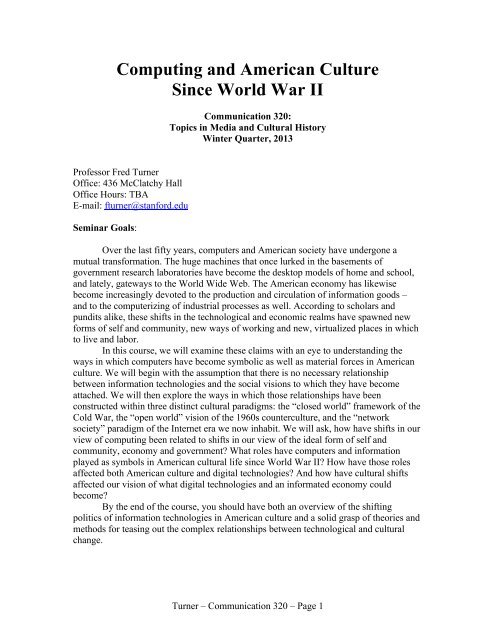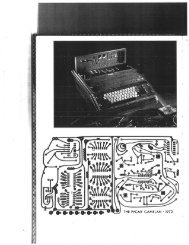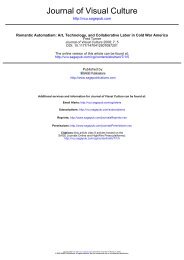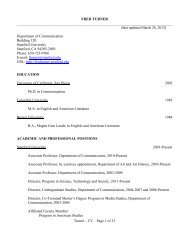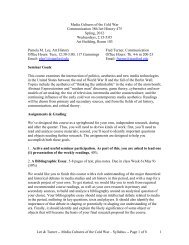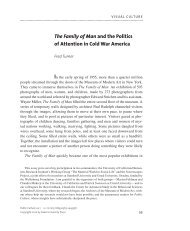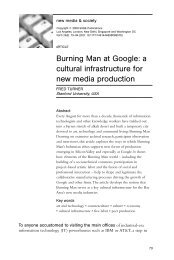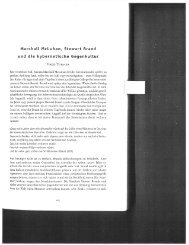Comm 320 Syllabus W13 PUBLIC - Fred Turner - Stanford University
Comm 320 Syllabus W13 PUBLIC - Fred Turner - Stanford University
Comm 320 Syllabus W13 PUBLIC - Fred Turner - Stanford University
You also want an ePaper? Increase the reach of your titles
YUMPU automatically turns print PDFs into web optimized ePapers that Google loves.
Computing and American Culture<br />
Since World War II<br />
Professor <strong>Fred</strong> <strong>Turner</strong><br />
Office: 436 McClatchy Hall<br />
Office Hours: TBA<br />
E-mail: fturner@stanford.edu<br />
Seminar Goals:<br />
<strong>Comm</strong>unication <strong>320</strong>:<br />
Topics in Media and Cultural History<br />
Winter Quarter, 2013<br />
Over the last fifty years, computers and American society have undergone a<br />
mutual transformation. The huge machines that once lurked in the basements of<br />
government research laboratories have become the desktop models of home and school,<br />
and lately, gateways to the World Wide Web. The American economy has likewise<br />
become increasingly devoted to the production and circulation of information goods –<br />
and to the computerizing of industrial processes as well. According to scholars and<br />
pundits alike, these shifts in the technological and economic realms have spawned new<br />
forms of self and community, new ways of working and new, virtualized places in which<br />
to live and labor.<br />
In this course, we will examine these claims with an eye to understanding the<br />
ways in which computers have become symbolic as well as material forces in American<br />
culture. We will begin with the assumption that there is no necessary relationship<br />
between information technologies and the social visions to which they have become<br />
attached. We will then explore the ways in which those relationships have been<br />
constructed within three distinct cultural paradigms: the “closed world” framework of the<br />
Cold War, the “open world” vision of the 1960s counterculture, and the “network<br />
society” paradigm of the Internet era we now inhabit. We will ask, how have shifts in our<br />
view of computing been related to shifts in our view of the ideal form of self and<br />
community, economy and government? What roles have computers and information<br />
played as symbols in American cultural life since World War II? How have those roles<br />
affected both American culture and digital technologies? And how have cultural shifts<br />
affected our vision of what digital technologies and an informated economy could<br />
become?<br />
By the end of the course, you should have both an overview of the shifting<br />
politics of information technologies in American culture and a solid grasp of theories and<br />
methods for teasing out the complex relationships between technological and cultural<br />
change.<br />
<strong>Turner</strong> – <strong>Comm</strong>unication <strong>320</strong> – Page 1
Readings:<br />
We will frame our investigations by reading key scholarly accounts of the periods<br />
in question. The recommended readings are designed to give you further resources for<br />
exploring the historical and/or theoretical dimensions of each week’s work.<br />
Required Texts:<br />
Edwards, Paul N. The Closed World: Computers and the Politics of Discourse in Cold<br />
War America. Cambridge, MA: MIT Press, 1996<br />
Wiener, Norbert. The Human Use of Human Beings: Cybernetics and Society. New York,<br />
N.Y.: Da Capo Press, 1988.<br />
Martin, Reinhold. The Organizational Complex: Architecture, Media, and Corporate Space.<br />
Cambridge, MA: MIT Press, 2003.<br />
Bell, Daniel. The Coming of Post-Industrial Society: A Venture in Social Forecasting. New<br />
York: Basic Books, 1973. (any edition ok)<br />
<strong>Fred</strong> <strong>Turner</strong>, From Counterculture to Cyberculture: Stewart Brand, the Whole Earth<br />
Network, and the Rise of Digital Utopianism (Chicago: <strong>University</strong> of Chicago Press,<br />
2006)<br />
Castells, Manuel. The rise of the network society. Cambridge, Mass.: Blackwell<br />
Publishers, 2000. (Note: Double-check edition: you need the 2000 edition, not the 1996)<br />
Coleman, E. Gabriella. Coding Freedom: The Ethics and Aesthetics of Hacking. Princeton and<br />
Oxford: Princeton <strong>University</strong> Press, 2012.<br />
Henry Jenkins, Convergence Culture (Cambridge: MIT Press, 2006)<br />
Galloway, Alexander R. Gaming: Essays on Algorithmic Culture. Minneapolis: <strong>University</strong> of<br />
Minnesota Press, 2006.<br />
Zittrain, Jonathan. The Future of the Internet and How to Stop It. New Haven Conn.: Yale<br />
<strong>University</strong> Press, 2008.<br />
<strong>Turner</strong> – <strong>Comm</strong>unication <strong>320</strong> – Page 2
Requirements and Expectations:<br />
Class Discussion:<br />
You’ll need to come to class with the reading done and several questions in mind<br />
for discussion. Try to think of class meetings as a resource session in which you can get<br />
your questions answered and at the same time, learn what questions are driving your<br />
fellow students.<br />
“Opening” a Text for Class Discussion: Due Date TBA<br />
At some point in the course, you will be asked to “open” a text for class<br />
discussion. This is a more formal proposition than it may sound. To do it effectively, you<br />
will need to be able to summarize the key arguments of the text and suggest how they<br />
connect to themes in our ongoing discussion. You will also need to identify and propose<br />
key questions for subsequent discussion.<br />
The Research Project:<br />
Over the course of the quarter you will complete a research paper of 15-20 pages.<br />
The paper is designed to help you analyze core themes in the course, practice dealing<br />
with primary materials, and develop a background in the area that will allow you to<br />
pursue more in-depth research projects in the future. You may choose one of three<br />
models in building your project. All three require a mid-term proposal. One tip: it’s<br />
always a good idea to check ideas you’re thinking about with me or your classmates<br />
before developing a full proposal. It’s also a very good idea to look ahead in the syllabus<br />
and get started early.<br />
Model 1: Historical<br />
Identify a group of people, texts or artifacts within any one of the three periods<br />
we’ve studied and analyze the roles played by information and/or information<br />
technology in organizing their perceptions of self, community, and work. Based<br />
on your analysis, how should we understand the relationship of information and<br />
information technology to processes of social and cultural change?<br />
Model 2: Comparative<br />
Choose a single concept that appears in each of the three periods under<br />
consideration (such as “virtuality” or “information”) and compare its deployment<br />
across the three periods. Based on your analysis, what accounts for the shifts in<br />
the meanings of this idea? What do these shifts tell you about the relationship of<br />
information and information technology to processes of social and cultural<br />
change?<br />
<strong>Turner</strong> – <strong>Comm</strong>unication <strong>320</strong> – Page 3
Model 3: Your Call<br />
I’m open to other questions and approaches for a final project. For your mid-term<br />
proposal, submit a detailed written proposal explaining the project, how it relates<br />
to the course, and why it is preferable to the other two options. As with the other<br />
models, be sure to include a literature review. (Note: This option is particularly<br />
appropriate for late-stage graduate students who may have substantial projects<br />
already under way and who may want to link issues in the course to those<br />
projects.)<br />
The Midterm Presentation and Proposal:<br />
Preliminary Presentation Due February 7<br />
Based on your notes for your written proposal, give a 10-minute presentation on your<br />
research to the class. Tell us what your core questions are, what artifacts or communities<br />
or texts you will be looking at and how, and give us some sense of the likely pay off for<br />
your work, empirically and analytically. The class will give you feedback which you will<br />
likely then want to incorporate into your written proposal.<br />
Written Proposal Due February 14<br />
Write a 4 to 5-page proposal for your project. The proposal should include:<br />
1. A description of your object of study, its significance, and the fundamental<br />
issues or questions you want to address in your research. Do you have a novel<br />
approach or hypothesis? What is it?<br />
2. A brief, tightly-focused review of the scholarly literature on your topic. This<br />
review should deal with the key works in your own narrow area, but should<br />
also deal with any important research on your topic carried out in other fields.<br />
You should explain how your work will relate to the works you cite.<br />
3. A brief discussion of research methods. What kind of research methods will<br />
you use to answer the questions you’ve posed or to test your hypothesis?<br />
Textual analysis? Archival research? Interviews? Why are those the best<br />
methods for this case? What will they allow you to see? Do you need any<br />
special resources to complete your research? And are they available locally?<br />
4. A timetable. What are the key parts of your project (research, writing, etc.)<br />
and by when will you have them completed?<br />
The Final Paper: Due by 5 PM Thursday March 21<br />
Please submit Microsoft Word files by email attachment<br />
<strong>Turner</strong> – <strong>Comm</strong>unication <strong>320</strong> – Page 4
Grading:<br />
Class Participation (including opening a text): 30%<br />
Midterm proposal: 20%<br />
Final Project: 50%<br />
PART 1: THE CLOSED WORLD: INFORMATION, TECHNOLOGY AND THE<br />
COLD WAR<br />
Week 1 – January 10: Introductions: Computing and Cultural Theory<br />
Williams, Raymond. “Base and superstructure in Marxist cultural theory (rpt. from<br />
Williams, Raymond, Problems in materialism and culture. London:Verso, 1980, 31-49).”<br />
Rethinking popular culture: contemporary perspectives in cultural studies. Eds. Chandra<br />
Mukerji and Michael Schudson. Berkeley: <strong>University</strong> of California Press, 1991. 407-423.<br />
Edwards The Closed World, Chapters 1-5<br />
Ensmenger, Nathan. “Power To The People: Toward a Social History of Computing”<br />
http://www.sas.upenn.edu/~nathanen/files/ensmenger-26-1.pdf<br />
Recommended:<br />
Carey, James W. “Technology and Ideology: The Case of the Telegraph,”<br />
<strong>Comm</strong>unication as Culture: Essays on Media and Society (New York: Routledge, 1992):<br />
201-230<br />
Thompson, John B. Ideology and modern culture: critical social theory in the era of mass<br />
communication. <strong>Stanford</strong>, Calif.: <strong>Stanford</strong> <strong>University</strong> Press, 1990.<br />
Foucault, Michel. “Two lectures.” Culture/power/history: a reader in contemporary<br />
social theory. Eds. Nicholas B. Dirks, Geoff Eley and Sherry B. Ortner. Princeton:<br />
Princeton <strong>University</strong> Press, 1994: 200-221.<br />
Week 2: January 17: Cybernetics: Linking Machine Culture and Research Culture<br />
Required Readings:<br />
Langdon Winner, “Technologies as Forms of Life” in The Whale and the Reactor, pp. 3-<br />
18<br />
Norbert Wiener, The Human Use of Human Beings. Ch’s 1-3, 5<br />
<strong>Turner</strong> – <strong>Comm</strong>unication <strong>320</strong> – Page 5
Bowker, Geof. “How to Be Universal: Some Cybernetic Strategies, 1943-1970.” Social<br />
Studies of Science 23 (1993): 107-27.<br />
Galison, Peter. “The Ontology of the Enemy: Norbert Wiener and the Cybernetic<br />
Vision.” Critical Inquiry 21, no. Autumn (1994): 228-266.<br />
Recommended Reading:<br />
Chun, Wendy Hui Kyong. Control and Freedom: Power and Paranoia in the Age of Fiber<br />
Optics. Cambridge, Mass.: MIT Press, 2006.<br />
Hayles, How We Became Post-Human (esp. ch. 4 “Liberal Subjectivity Imperiled:<br />
Norbert Wiener and Cybernetic Anxiety”)<br />
Edwards, “The Machine in the Middle,” ch. 6 of The Closed World<br />
Berkeley, Edmund Callis. Giant Brains; or, Machines That Think. New York,: Wiley,<br />
1949.<br />
Slava Gerovitch, From Newspeak to Cyberspeak: A History of Soviet Cybernetics.<br />
Cambridge: MIT Press, 2002.<br />
Week 3 – January 24: Computing and Cold War Aesthetics<br />
Required:<br />
Martin, The Organizational Complex, Chapters 1,2 & 5<br />
Colomina, Beatriz. "Enclosed by Images: The Eameses' Multimedia Architecture." Grey<br />
Room 2, no. Winter (2001): 6-29.<br />
Spigel, Lynn. “Outer Space and Inner Cities: African-American Responses to NASA,” in<br />
Spigel, Welcome to the Dreamhouse: Popular Media and Postwar Suburbs, Console-Ing<br />
Passions. Durham, NC: Duke <strong>University</strong> Press, 2001: 141-182.<br />
Recommended:<br />
The films of Ray and Charles Eames (on DVD, at SUL)<br />
Colomina, Beatriz. Domesticity at War. Cambridge, Mass.: MIT Press, 2007.<br />
Colomina, Beatriz, Annmarie Brennan, and Jeannie Kim. Cold War Hothouses: Inventing<br />
Postwar Culture from Cockpit to Playboy. 1st ed. New York: Princeton Architectural<br />
Press, 2004.<br />
<strong>Turner</strong> – <strong>Comm</strong>unication <strong>320</strong> – Page 6
Light, Jennifer S. From Warfare to Welfare: Defense Intellectuals and Urban Problems<br />
in Cold War America. Baltimore: Johns Hopkins <strong>University</strong> Press, 2003.<br />
PART 2: THE OPEN WORLD: INFORMATION, TECHNOLOGY AND THE<br />
COUNTERCULTURE<br />
Week 4 – January 31: Countercultural Cybernetics: Visions of Media and<br />
Technology<br />
<strong>Fred</strong> <strong>Turner</strong>, From Counterculture to Cyberculture, Chicago: <strong>University</strong> of Chicago<br />
Press, 2006: Chapters 1-3<br />
Kreiss, Daniel. "Appropriating the Master's Tools: Sun Ra, the Black Panthers, and Black<br />
Consciousness, 1952-1973." Black Music Research Journal 28, no. 1 (2009): 57-81.<br />
Recommended reading:<br />
Buckminster Fuller, Operating Manual for Spaceship Earth (1969)<br />
Rayvon Fouché. "Say It Loud, I'm Black and I'm Proud: African Americans, American<br />
Artifactual Culture, and Black Vernacular Creativity." American Quarterly 58, no. 3<br />
(2006): 639-61. Available online via Project Muse.<br />
Star, Susan Leigh, and James Greisemer. "Institutional Ecology, Translations, and<br />
Boundary Objects: Amateurs and Professionals in Berkeley's Museum of Vertebrate<br />
Zoology, 1907-1939." Social Studies of Science 19, no. 387-420 (1989): 387-420.<br />
Peter Galison, “Trading zone: coordinating action and belief.” The science studies<br />
reader. Ed. Mario Biagioli. New York and London: Routledge, 1999. 137-160<br />
David Farber, “The intoxicated state/illegal nation: drugs in the sixties counterculture.”<br />
Imagine Nation. Eds. Peter Braunstein and Michael William Doyle. New York:<br />
Routledge, 2002. 17-40<br />
Braunstein, Peter, and Michael William Doyle. “Introduction: historicizing the American<br />
counterculture of the 1960s and '70s.” Imagine Nation. Eds. Peter Braunstein and<br />
Michael William Doyle. New York: Routledge, 2002. 5-14.<br />
Week 5 – February 7: The Information Society Paradigm and the Critique of<br />
Technocracy<br />
In Class: Present Research Proposals<br />
Bell, Daniel. The Coming of Post-Industrial Society: A Venture in Social Forecasting. New<br />
York: Basic Books, 1973. Read Introduction, Chapters 2, 3, 6, Coda<br />
<strong>Turner</strong> – <strong>Comm</strong>unication <strong>320</strong> – Page 7
Recommended:<br />
Daniel Bell, “The social framework of the information society.” The computer age: a<br />
twenty-year view. Eds. Michael Dertouzos and Joel Moses. Cambridge, MA: MIT Press,<br />
1979: 163-211<br />
Ensmenger, Nathan. The Computer Boys Take Over: Computers, Programmers, and the Politics<br />
of Technical Expertise. Cambridge, Mass.: MIT Press.<br />
Theodore Roszak, The making of a counter culture: reflections on the technocratic<br />
society and its youthful opposition. Berkeley: <strong>University</strong> of California Press, 1969/1995<br />
Introduction, Preface, Chapters 1, 2, 7, 8<br />
Herbert Marcuse, One dimensional man: studies in the ideology of advanced industrial<br />
society. Boston: Beacon Press, 1964 (esp. chapters 1 & 2).<br />
Reich, Charles A. The Greening of America New York: Random House, 1970. Chapters<br />
1, 2, 4, 6, 9, 11<br />
Daniel Bell, The Cultural Contradictions of Capitalism New York: Basic Books, 1976.<br />
Gouldner, Alvin Ward. The future of intellectuals and the rise of the new class: a frame<br />
of reference, theses, conjectures, arguments, and an historical perspective on the role of<br />
intellectuals and intelligentsia in the international class contest of the modern era. New<br />
York: Oxford <strong>University</strong> Press, 1982.<br />
Part 3: Networked Society, Networked Production<br />
Week 6 – February 14: The Network Society<br />
Research Proposals Due<br />
Manuel Castells, The Rise of the Network Society, Second Edition, Selections:<br />
Prologue – all (pp.1-27)<br />
Ch. 1 – pp. 28-100 (skim)<br />
Ch. 3 – pp. 163-188, 206-215<br />
Ch.4 – 216-223, 255-267<br />
Ch. 6 -- 407-429, 440-459<br />
Conclusion & Summary: 500-512<br />
Recommended:<br />
Abbate, Janet. Inventing the Internet. Cambridge, Mass: MIT Press, 1999.<br />
<strong>Turner</strong> – <strong>Comm</strong>unication <strong>320</strong> – Page 8
Saxenian, AnnaLee. Regional advantage: culture and competition in Silicon Valley and<br />
Route 128. Cambridge, Mass.: Harvard <strong>University</strong> Press, 1994.<br />
Frank Webster, “Information, Restructuring and Globalization” pp. 59-96 and<br />
“Informational Capitalism,” in Theories of the Information Society (2 nd ed.), pp. 97-123<br />
Week 7 – February 21: Countercultural Networks of Production:<br />
Coleman, E. Gabriella. Coding Freedom: The Ethics and Aesthetics of Hacking. Princeton and<br />
Oxford: Princeton <strong>University</strong> Press, 2012.<br />
Recommended Readings:<br />
Kelty, Christopher M. Two Bits: The Cultural Significance of Free Software, Experimental<br />
Futures. Durham: Duke <strong>University</strong> Press, 2008<br />
Ensmenger, Nathan. “Open Source’s Lessons for Historians”<br />
http://www.sas.upenn.edu/~nathanen/files/ensmenger-26-4.pdf<br />
Benkler, Yochai. The Wealth of Networks: How Social Production Transforms Markets and<br />
Freedom. New Haven: Yale <strong>University</strong> Press, 2006.<br />
Kreiss, Daniel, Megan Finn, and <strong>Fred</strong> <strong>Turner</strong>. "The Limits of Peer Production: Some Reminders<br />
from Max Weber for the Network Society." New Media & Society 13, no. 2 (2011): 243-59.<br />
Langdon Winner, “Do Artifacts Have Politics?” The Whale and the Reactor, pp. 19-39<br />
Lawrence Grossberg, “Articulation and Culture,” We Gotta Get Out of This Place, pp.<br />
37-67.<br />
<strong>Fred</strong> <strong>Turner</strong>, From Counterculture To Cyberculture, Chapter 4, “Taking the Whole Earth<br />
Digital.”<br />
Eric S. Raymond, “The Cathedral and the Bazaar,” available:<br />
http://catb.org/~esr/writings/cathedral-bazaar/cathedral-bazaar/<br />
Tiziana Terranova, “Free labor: producing culture for the digital economy.” Social Text<br />
18.2 (2000): 33-58.<br />
Kollock, Peter, and Marc A. Smith. <strong>Comm</strong>unities in Cyberspace. London ; New York:<br />
Routledge, 1999.<br />
Walter Powell, “Neither market nor hierarchy: network forms of organization.” Research<br />
in Organizational Behavior 12 (1990): 295-336.<br />
Week 8 – February 28: Networked Mass Media:<br />
<strong>Turner</strong> – <strong>Comm</strong>unication <strong>320</strong> – Page 9
Required:<br />
Jenkins, Henry. Convergence Culture: Where Old and New Media Collide. New York: New<br />
York <strong>University</strong> Press, 2006 (selections TBA)<br />
Recommended:<br />
Andrejevic, Mark. Ispy: Surveillance and Power in the Interactive Era. Lawrence, Kan.:<br />
<strong>University</strong> Press of Kansas, 2007.<br />
Michael Hardt and Antonio Negri, “The Dangerous Classes,” from Multitude, pp. 103-<br />
115 and 140-153.<br />
Week 9 – March 7: Culture as Infrastructure<br />
Required:<br />
Galloway, Alexander R. Gaming: Essays on Algorithmic Culture. Minneapolis: <strong>University</strong> of<br />
Minnesota Press, 2006.<br />
Recommended:<br />
Bittanti, Matteo, ed. Gamescenes: Art in the Age of Videogames (Milan, Italy: Johan &<br />
Levi, 2006).<br />
Bourriaud, Nicolas. Relational Aesthetics, Collection Documents Sur L'art. [Dijon]: Les Presses<br />
du réel, 2002.<br />
<strong>Turner</strong>, <strong>Fred</strong>. "Burning Man at Google: A Cultural Infrastructure for New Media Production."<br />
New Media & Society 11, no. 1&2 (2009): 73-94.<br />
Week 10 – March 14: The Next Paradigm?<br />
Zittrain, Jonathan. The Future of the Internet and How to Stop It. New Haven Conn.: Yale<br />
<strong>University</strong> Press, 2008. (Selections to be announced)<br />
Recommended:<br />
Liu, Alan. The Laws of Cool: Knowledge Work and the Culture of Information. (Chicago:<br />
<strong>University</strong> of Chicago Press, 2004).<br />
Terranova, Tiziana. Network Culture: Politics for the Information Age. (London ; Ann<br />
Arbor, MI: Pluto Press, 2004).<br />
<strong>Fred</strong> <strong>Turner</strong>, From Counterculture to Cyberculture, Chapters 6-8.<br />
<strong>Turner</strong> – <strong>Comm</strong>unication <strong>320</strong> – Page 10


